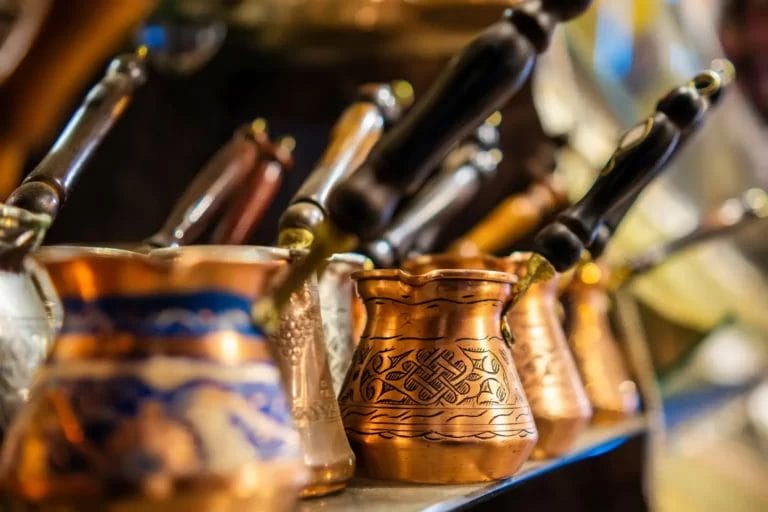Turkish coffee has been a part of Turkish culture for almost five centuries. But what makes Turkish coffee so unique, and how integrated is it in the culture?

And today, we’re going to answer all your questions, dear coffee lovers. So keep sipping your coffee while you read about the most culturally rich coffee ever.
What is Turkish Coffee
The term “Turkish coffee” doesn’t refer to a particular coffee bean; rather, it refers to a traditional brewing method. Native Turks put so much love and thought into the process that traditional Turkish coffee is prepared only with a specific procedure.
And before you ask, no, it cannot be replicated using any coffee machine available today. Even serving this coffee takes the host’s effort to be complete, which is an entirely manual process. The coffee is always served with a glass of water to wash away any other tastes from the mouth before enjoying this fantastic coffee.
The History of Turkish Coffee
The Turks adopted coffee as a beverage back in the mid-15th century, making them one of the first to do so. Considering that Turkish coffee has recently become a worldwide craze, you could say they had centuries to perfect their craft.
The history of Turkish coffee has a little conflict as to how the coffee reached the popularity levels of today, but they’re interesting to know about nonetheless.
The history makes you realize what made Turkish coffee so famous that even non-coffee drinkers know what it’s all about.
The first and the more popular theory is that a couple of Syrian refugees built the first coffee shops in the country.
The other one is blander, which suggests that an Ottoman governor of Yemen introduced coffee to the Caliph at the time, Suleiman the Magnificent. The Sultan loved it so much that he encouraged his empire to make this drink mainstream.
The First Coffee Shop
Let’s reflect back on the coffee shop story.
The first coffee house of Turkey, named “Kaveh Kanes,” was opened in Tahtakale, Istanbul, in 1554 by two Syrian refugees named Hakam and Shams. Since coffee and cafe culture was relatively new to the Ottoman empire, its popularity spread quickly.
Coffee shops were the new local gathering, where everyone could gather and discuss the news, weather, politics, or just play games like backgammon and chess. This tradition is still alive in Turkish cafes, where you can request to play a chess game while enjoying your coffee.
But the happiness didn’t last long. Ottoman Grand Vizier Köprülü demanded coffee shops be shut down in the 17th century. Why? Because he thought that people who were discussing politics in cafes were making conspiracies and plans to overthrow the Sultan.

If people chose not to obey the rule, they would be punished by severe beating and even drowning. Such a terrible punishment, just for wanting to have fun in their free time.
The locals were really upset about the entire situation, and they started rioting in the street. Eventually, the empire saw this as an unwise decision and decided to remove the ban slowly. But instead of punishing the general masses, they decided to punish the cafes by charging them extra taxation.
Even though all the bans and strict standing of the ruling party against coffee shops, Turkish coffee continued to grow popular and eventually spread to different parts of the world. Europe and France were lucky to experience Turkish coffee recipes in their most original form, and all their modern brewing techniques are inspired by it.
In modern times, this coffee brewing method is considered cultural heritage, and it’s also a part of UNESCO‘s Intangible Cultural Heritage List. UNESCO added this coffee to the list as a token of appreciation for the message of love and peace this coffee has spread worldwide and among Turkish people.
Cultural Significance of Turkish Coffee
The Turks have a saying that specifies how coffee should be: “Black as hell, strong as death, and sweet as love .”This contrast of flavors is also used as a symbol of life and the various aspects of Turkish culture.
Turkish Coffee And Marriage
Did you know that the potential for a woman to be a perfect bride is based on how good of a cup of coffee they make?

If a woman from a Turkish household makes a fantastic cup of Turkish coffee, it establishes her potential to be an amazing housewife later on. The coffee is also used as a subtle hint of approval and views on their potential bridegroom.
If you’re presenting a marriage proposal and presented with a sweet cup of coffee, a response, congratulate yourself and be on your merry way to make preparations for the marriage. But on the other hand, if you receive a bitter coffee, your proposal has been formally rejected since bitterness is a hint of disinterest.
Another way to test the bridegroom with the coffee added in more recently is to present the coffee with a peculiar ingredient, like salt. If he drank through the whole cup of salty coffee without a second question, it symbolized his patience and perseverance, along with high maturity.
The most exciting part about this culture is it’s not just a strange story from the past. On the contrary, this practice still persists in the modern days!
Want to learn about another traditional coffee? Check out our piece on what is cafe de olla.
Turkish coffee and fortune telling
From the worldly bonds of marriage to otherworldly interventions of the spirits, like fortune-telling, Turkish coffee is an inseparable part of both. Various fortune-tellers use Turkish coffee to assess your fate. But how, you may ask?
When you prepare unfiltered coffee, you’ll find coffee grounds in your coffee cup, and that’s a given. The fortune-tellers brew unfiltered Turkish coffee for you and let the grounds slowly sink under the cup.
Once you’re done drinking the coffee, they’ll assess the patterns of the grounds that are gathered at the bottom of your cup to tell you about your near or distant future.

Flavor Profile Of Turkish Coffee
Turkish coffee’s flavor is decided the moment the coffee gets ground. It uses a very fine grind of Arabic coffee beans, and the brewing method works really well to bring out the most taste available in the coffee granules.
Turkish coffee brewing method feels less like brewing coffee and more like cooking. Because the finely ground Arabic coffee beans look less like coffee grounds and more like cocoa powder.
The coffee offers a strong taste and aroma that is unique compared to many other coffee beans, and the flavor comes from the unique bean grinds and the brewing method itself. The coffee maintains an outstanding balance of sweetness and bitterness if brewed right. The condensed taste can give you an Espresso-like flavor if you take it without sugar.
The frothy coffee has a dense texture and is served in small porcelain cups, but only half of the cup has coffee in it. The rest of the cup is coffee sediments left from an unfiltered brew.
Turkish Coffee Ingredients
Here’s what you need to brew this special coffee:
- Cold water (1 cup)
- Finely ground coffee (1 tablespoon of consistent grind)
- Ground cardamom (⅛ teaspoon)
- 1 teaspoon of sugar (optional)
- Ibrik (traditional Turkish water container with spout)/ A Cezve (Turkish Coffee Pot)/ A saucepan
- Porcelain demitasse cups (for serving)
Recipe For Turkish Coffee
- Put the water and sugar in the ibrik/ saucepan.
- Bring the mixture to a boil.
- Once the mixture is boiled, take the pot off the heat.
- Add in the required amount of cardamom and coffee.
- Boil the mixture once again.
- When you see foams appear on top of the coffee, turn the heat off.
- After it’s cooled down, repeat the previous two steps.
- Once you’re done this time, pour the coffee into your serving cups, and let them sit for a few minutes. That’ll help the unfiltered coffee grounds to settle at the bottom of the cup.
Many boil the water with sugar and coffee instead and then add milk once the coffee powder has settled down. But this is not a traditional way of serving coffee.
The Turks believe that coffee is never served with milk, so you lose your credibility by adding milk even when you brew with the traditional method.
But if you’re a hardcore traditionalist, you’ll have to go one step further and brew this coffee using hot sand instead of a stove.
Had fun reading? You’ll love to read our piece on what is laurina coffee.
Bottom Line
Let’s end on a poetic note to show the fine traditional coffee all the honor and respect it deserves.

FAQs
It is made by heating unfiltered ground coffee in water, using a traditional water container named “Ibrik.”
You can serve or drink Turkish coffee with milk. But since the traditional recipe for it doesn’t include milk, you’ll essentially be “going away from the tradition,” so to speak.
The similarities between Turkish coffee and Espresso are really close, but the unique aroma and strength of it is what sets it apart from traditional Espresso.
With Arabic beans in consideration, a cup of it contains 165 mg of caffeine.
Turkish coffee has been a part of Turkish culture for several centuries. The Turks consider it an inseparable part of their daily lives even to this day, making this caffeinated beverage very special.

